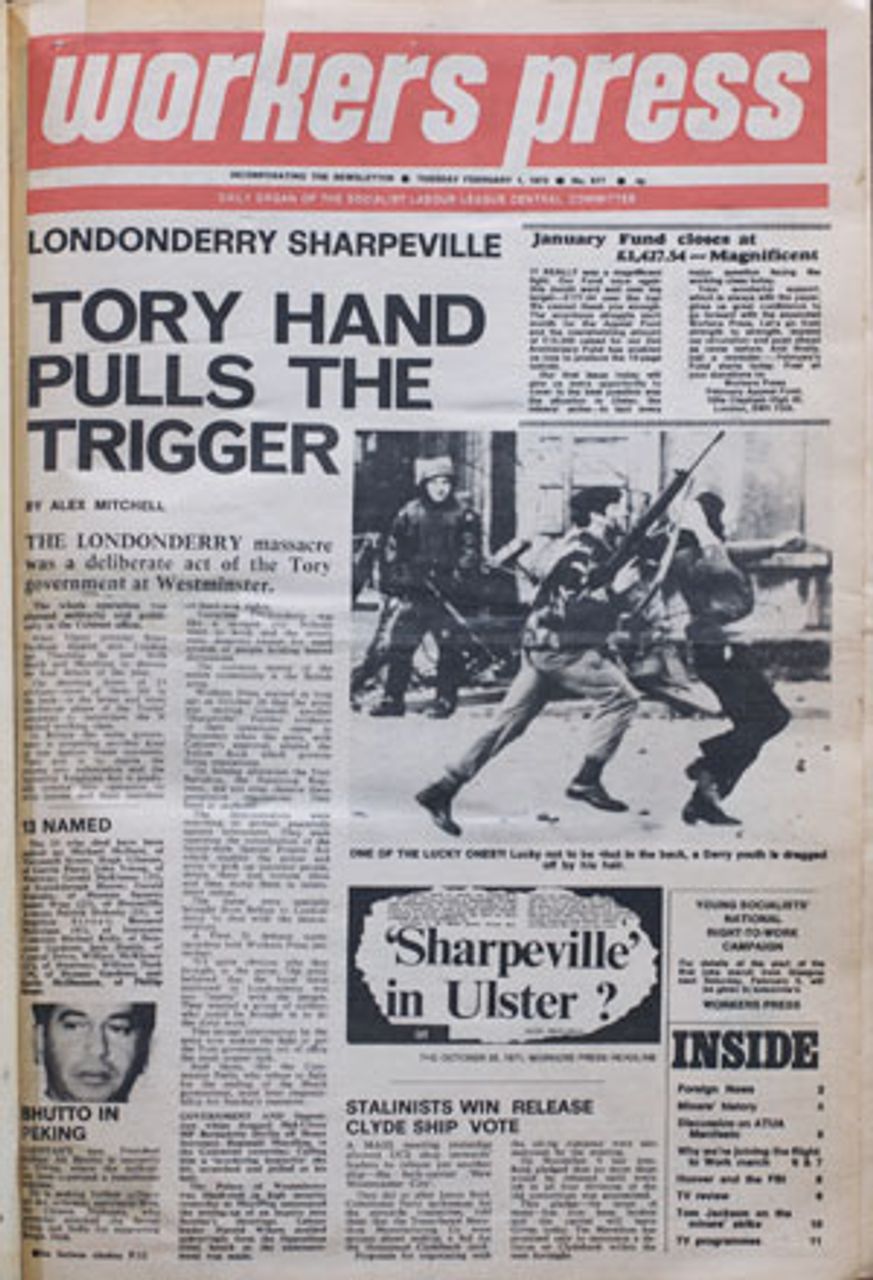
Photo: By Ozgurgerilla -
In the late 1960s Ken Loach began attending meetings of the Socialist Labour League (SLL), a revolutionary Marxist organisation committed to overthrowing the state and installing a dictatorship of the proletariat. A member of the SLL was Jim Allen, a writer of television dramas. Loach admitted that Allen was a major political influence on him. Allen and Loach worked together on a number of television productions such as "The Big Flame", "The Rank and File" and "Days of Hope." All of these were thinly disguised Marxist propaganda.


The SLL subsequently transformed itself into the Workers Revolutionary Party (WRP). While Allen had left the organisation by this stage, he continued to be influenced by its prevailing politics. And there was one dominating theme of the WRP from 1976 through 1985: pathological anti-Zionism. Its daily newspaper, News Line, had cheered on Saddam Hussein, Colonel Gaddafi and Yasser Arafat. In a leaked internal report of the party, it was disclosed that various Arab regimes had funded the Party, and, in particular, the party acted as a collector of information for Libyan Intelligence. The WRP were to provide intelligence information on Jews, that the party claimed were part of a “powerful Zionist connection” and the required information included the “activities, names and positions” that “Zionists” held in “finance, politics, business, the communications media and elsewhere.” The group handed over “intelligence” reports to Tripoli for eight years, from 1976 until 1984. The required duties of the WRP had, as the report puts it, “strongly anti-semitic undertones, as no distinction is made between Jews and Zionists and the term Zionist could actually include every Jew in a leading position.” As one commentator said, “Put plainly, they were Jew-spotting in the media, politics and business.”
In line with such anti-Zionist views, Jim Allen wrote a stage play, "Perdition" that was due to be shown at the Royal Court Theatre in London in 1987, and directed by Loach. Allen said that "Perdition" was “the most lethal attack on Zionism ever written, because it touches on the heart of the most abiding myth of modern history, the Holocaust. Because it says quite plainly that privileged Jewish leaders collaborated in the extermination of their own kind in order to bring about a Zionist state, Israel, a state which is itself racist.” The argument of the play was that Zionist Jews collaborated with the Nazis during the Holocaust and that they wanted dead Jews in order to get sympathy after the war in order to get a state: Israel. The play was agitprop and "faction": a mix of fiction and fact set in a courtroom to indict Zionism.
David Rose, a journalist for the Guardian, saw a press preview pack containing the text of the play. After reading it, he was livid. He spent some time researching the claims in the play and had an article published in the Guardian entitled, "Rewriting the Holocaust." A national debate ensued and the accusation from Jewish communal bodies was that the play was a gross libel on the Jews who had largely died in the Holocaust. Leading Holocaust historians such as Martin Gilbert and David Cesarani denounced the play in no uncertain terms. As an example, Gilbert said that the play was “not historical in any academic or precise sense” and that the allegations in the play were “disgraceful.” He stated that the claim that the Jewish Council participated in the extermination of Jews was “a farrago of nonsense.” He was in no doubt: the play was "deeply anti-Semitic." The Jewish Chronicle claimed the play "viciously perverted" history with a "monstrous lie."
Ultimately, Max Stafford-Clark, the Artistic Director of the Royal Court Theatre, lost confidence in the play and decided to pull the production less than two days before the public previews of the play were due to commence. Ken Loach went to the press. He blamed "the organised Zionist lobby" for the withdrawal of the play. He argued that the theatre had caved in to pressure from prominent British Jews such as Dr. Stephen Roth, Lord Weidenfeld, and Lord Goodman; men, Loach said, “who can buy their way.” He claimed there was "a coordinated movement" by those with a "Mafia-like ability to squeeze the play out." The mantra of the Zionist conspiracy became stock in trade for Allen and Loach. At a press conference in July 1987, Allen and Loach claimed that a “Zionist conspiracy” had infiltrated British broadcasting, publishing and theatre. They alleged that the main daily newspapers and several theatres had been incapacitated by a “small but powerful” international Zionist lobby.”
While this was over thirty years ago, it should not be forgotten. Ken Loach supported a play that grossly distorted the Holocaust for an anti-Zionist political view, and that despite a clear statement from the theatre that the play was pulled as the Artistic Director had lost confidence in it, insisted some kind of conspiracy by a powerful Zionist lobby, even when David Rose, who had sparked the debate said that he he was not even a Zionist, let alone part of a lobby. Loach's actions through this matter were inexcusable.
David Rose, a journalist for the Guardian, saw a press preview pack containing the text of the play. After reading it, he was livid. He spent some time researching the claims in the play and had an article published in the Guardian entitled, "Rewriting the Holocaust." A national debate ensued and the accusation from Jewish communal bodies was that the play was a gross libel on the Jews who had largely died in the Holocaust. Leading Holocaust historians such as Martin Gilbert and David Cesarani denounced the play in no uncertain terms. As an example, Gilbert said that the play was “not historical in any academic or precise sense” and that the allegations in the play were “disgraceful.” He stated that the claim that the Jewish Council participated in the extermination of Jews was “a farrago of nonsense.” He was in no doubt: the play was "deeply anti-Semitic." The Jewish Chronicle claimed the play "viciously perverted" history with a "monstrous lie."
Ultimately, Max Stafford-Clark, the Artistic Director of the Royal Court Theatre, lost confidence in the play and decided to pull the production less than two days before the public previews of the play were due to commence. Ken Loach went to the press. He blamed "the organised Zionist lobby" for the withdrawal of the play. He argued that the theatre had caved in to pressure from prominent British Jews such as Dr. Stephen Roth, Lord Weidenfeld, and Lord Goodman; men, Loach said, “who can buy their way.” He claimed there was "a coordinated movement" by those with a "Mafia-like ability to squeeze the play out." The mantra of the Zionist conspiracy became stock in trade for Allen and Loach. At a press conference in July 1987, Allen and Loach claimed that a “Zionist conspiracy” had infiltrated British broadcasting, publishing and theatre. They alleged that the main daily newspapers and several theatres had been incapacitated by a “small but powerful” international Zionist lobby.”
While this was over thirty years ago, it should not be forgotten. Ken Loach supported a play that grossly distorted the Holocaust for an anti-Zionist political view, and that despite a clear statement from the theatre that the play was pulled as the Artistic Director had lost confidence in it, insisted some kind of conspiracy by a powerful Zionist lobby, even when David Rose, who had sparked the debate said that he he was not even a Zionist, let alone part of a lobby. Loach's actions through this matter were inexcusable.
____________________________________________
I also previously uploaded a television documentary discussing the play with Martin Gilbert, Jim Allen and others. That can be seen here:https://undertheoculartree.wordpress.com/…/the-perdition-a…/
No comments:
Post a Comment